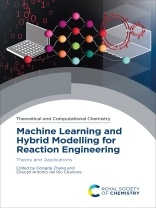Over the last decade, there has been a significant shift from traditional mechanistic and empirical modelling into statistical and data-driven modelling for applications in reaction engineering. In particular, the integration of machine learning and first-principle models has demonstrated significant potential and success in the discovery of (bio)chemical kinetics, prediction and optimisation of complex reactions, and scale-up of industrial reactors.
Summarising the latest research and illustrating the current frontiers in applications of hybrid modelling for chemical and biochemical reaction engineering, Machine Learning and Hybrid Modelling for Reaction Engineering fills a gap in the methodology development of hybrid models. With a systematic explanation of the fundamental theory of hybrid model construction, time-varying parameter estimation, model structure identification and uncertainty analysis, this book is a great resource for both chemical engineers looking to use the latest computational techniques in their research and computational chemists interested in new applications for their work.
Tabella dei contenuti
Physical Model Construction;Data-driven Model Construction;Hybrid Model Construction;Model Structure Identification;Model Uncertainty Analysis;Interpretable Machine Learning for Kinetic Rate Model Discovery;Graph Neural Networks for the Prediction of Molecular Structure–Property Relationships;Reaction Network Simulation and Model Reduction;Hybrid Modelling Under Uncertainty: Effects of Model Greyness, Data Quality and Data Quantity;A Data-efficient Transfer Learning Approach for New Reaction System Predictive Modelling;Constructing Time-varying and History-dependent Kinetic Models via Reinforcement Learning;Surrogate and Multiscale Modelling for (Bio)reactor Scale-up and Visualisation;Statistical Design of Experiments for Reaction Modelling and Optimisation;Autonomous Synthesis and Self-optimizing Reactors;Industrial Data Science for Batch Reactor Monitoring and Fault Detection
Circa l’autore
Dr E. Antonio Del Rio Chanona is a Lecturer at the Department of Chemical Engineering and the Centre for Process Systems Engineering, Imperial College London. His research interests include the application of optimisation and machine learning techniques to chemical engineering systems. He has been awarded numerous awards including the fellowship from the Engineering and Physical Sciences Research Council of the United Kingdom (2017) on “sustainable excretable biofuels process design and optimisation”, the Danckwerts-Pergamon Prize for the best Ph D thesis of his year at the Department of Chemical Engineering and Biotechnology, University of Cambridge (2017), designated a Top Young Author by the International Federation of Automatic Control (2018), awarded the Sir William Wakeham award by the Department of Chemical Engineering at Imperial College London for outstanding research achievements and contribution to the department (2019), received the Nicklin Medal by the Institution of Chemical Engineers (IChem E) in recognition for exceptional research that will have significant impact in areas of process systems engineering, industrialisation of bioprocesses, and adoption of intelligent and autonomous learning algorithms to chemical engineering (2020).












